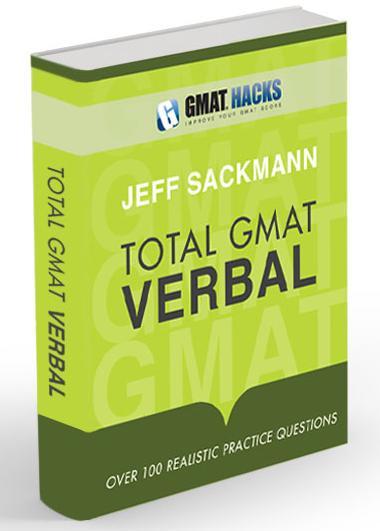
Bookshelf
|
|
Total GMAT Math Jeff's complete Quant guide, on sale now! |
|
|
Total GMAT Verbal Everything you need to ace GMAT Verbal! |
1,800 Practice Math Questions
Buy Jeff's books at Amazon.com

GMAT Official Guide, with IR
OG Math | OG Verbal
OG12 & Quant Rev solutions!
GMAT Question of the Day
Beginner's Guide to the GMAT
GMAT Hacks Affiliate Program

Recent Hacks

Categories
- General Study Tips
- Goals and Planning
- CAT Strategy
- The Mental Game
- GMAT Math Strategy
- GMAT Math Topics
- Mental Math
- Data Sufficiency
- Critical Reasoning
- Reading Comprehension
- Sentence Correction
- Analytical Writing Assessment
- Integrated Reasoning
- IR Explained
- Business School Admissions
- GMAT Prep Resources
- Practice Questions
- Total GMAT Math
- Total GMAT Verbal
- GMAT 111

Approaching GMAT Critical Reasoning Answer Choices
| You should follow me on Twitter. While you're at it, take a moment to subscribe to GMAT Hacks via RSS or Email. |
GMAT Verbal is very different from GMAT Math. That is particularly true of Critical Reasoning.
A colleague of mine shared an interesting story recently about the test development process of the LSAT, the test that would-be law students take. The makers of the LSAT, just like the GMAC, constantly test various aspects of the test to determine whether it is doing what they think it ought to do.
The LSAT folks apparently tested multiple sets of instructions for their CR-like questions. One set directed test-takers to find the choice that answers the question, the other set instructed them to find the "best choice." (GMAT instructions use the "best choice" terminology.)
The result? On the same questions, test-takers did worse when they were instructed to find the "best choice." My colleague's theory, which I agree with, is that the "best choice" phrasing suggests that at least one of the other choices is right (sort of right, anyway) just not as correct as the correct choice. You can get mired in comparing "right" answers, and the instructions are actually directing you to do so.
There's Only One Correct Answer
Don't fall into this trap. One way in which GMAT CR is like GMAT Math is that there's one right answer, and only one. The other four answers aren't "sort of right," "almost right," "kind of right," or any other kind of right. They are, quite simply, wrong.
Every GMAT instructor is constantly faced with students who want to explain why the wrong answer is actually right, or why it ought to be considered more seriously. What those students usually miss is that they are focusing on one part of the choice, not the entire thing. It only takes one word, or one clause, for an answer choice to be incorrect. If a choice is half-right, it's half-wrong, and if it's half-wrong, you should discard it.
Why Are They Wrong?
The various ways in which CR choices can be wrong is a bigger topic than I'm going to address today. Two chapters of the Total GMAT Verbal are devoted to classifying the different types of common wrong answer choices on CR questions, and two more focus on common wrong answer choices in Reading Comprehension.
The key to getting better at GMAT Critical Reasoning is in recognizing what makes these wrong answers wrong. As you study, you may sometimes find it difficult to pinpoint in words why a correct answer is correct. However, you should always be able to see (and explain) why each wrong answer is wrong.
That's the key -- you need to know what makes the wrong answers wrong. Your goal on every CR question should be as follows. For each wrong answer choice, you should be able to complete the sentence:
This choice is wrong because...
Sometimes that's easy; sometimes it's extremely difficult. But the difference between test-takers who ace the CR and those who flounder, consistently picking the "second best" answer, is this study tip. It forces you to understand the choices better, and in doing so, think with more focus about the CR question itself.
About the author: Jeff Sackmann has written many GMAT preparation books, including the popular Total GMAT Math, Total GMAT Verbal, and GMAT 111. He has also created explanations for problems in The Official Guide, as well as 1,800 practice GMAT math questions.
 |
Total GMAT Verbal
The comprehensive guide to the GMAT Verbal section. Recognize, dissect, and master every question type
you'll face on the test. Everything you need, all in one place, including 100+ realistic practice questions. |